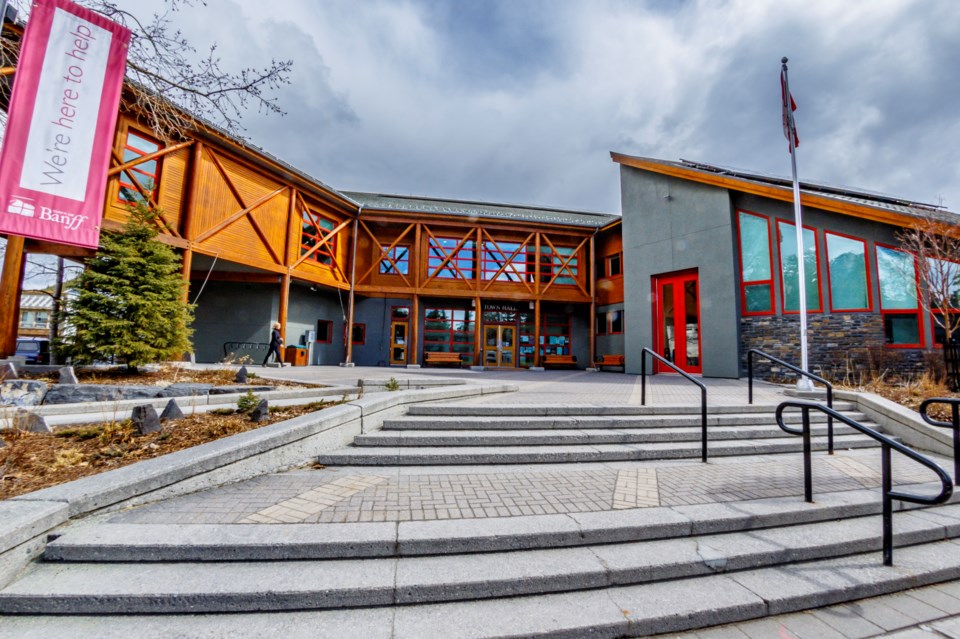BANFF – Banff residents and businesses could see a 6.01 per cent overall tax increase for 2020.
Approximately $246,865 in new municipal programs and services was tentatively approved during a month-long review, but it’s all up for final debate when the 2020-22 operating budget and 10-year capital plan come before council on Jan. 13.
The overall 6.01 increase – which includes 3.03 per cent in municipal taxes, 2.95 per cent in provincial education levy and 0.03 per cent for Bow Valley Regional Housing – amounts to a $132.50 annual increase on the average residential dwelling tax bill.
Coun. Grant Canning said he doesn’t want council to be held responsible for the provincial school tax increase, noting there’s pressure from the community to keep municipal taxes lower because of that unanticipated hike.
“Quite frankly, I refuse to take ownership or responsibility of something we don’t control,” he said, noting it’s just the municipality’s job to collect the education levy on behalf of the Alberta government.
“If someone has an issue with the provincial government and the decisions they make around the education levy, my suggestion is they contact their MLA. That is much more under her purview.”
In 2019, the Town of Banff collected $8,294,780 in school taxes for the Alberta government, but the final provincial requisition was $8,420,661. For 2020, a nine per cent hike in the education tax levy is estimated, which includes $125,881 shortfall from 2019.
For the Town to offer the same level of municipal services next year as this year requires a 1.26 per cent tax increase. The additional $246,865 in new programs and services adds another 1.77 per cent for a total jump in municipal taxes of 3.03 per cent.
Throughout the service review meetings that got underway in early December, Councillors Peter Poole and Ted Christensen consistently talked about finding savings, asking administration to bring back suggestions for potential budget cuts.
“I sometimes think we should each sit down and have a projected tax increase in our minds and discuss that first so we know as a group where we’re coming from,” said Coun. Christensen.
The new big ticket items involve expansion of public transit, as the municipality continues to grapple with traffic congestion, as well as ongoing prevention work so the townsite is better prepared in the event of a future wildfire.
Council has tentatively approved $60,000 a year to continue running the Calgary-Banff On-It service in the coming years, as well as another $60,000 to expand the service to seven days a week, starting in summer 2021.
In addition, another $50,000 has been set aside to increase frequency of the regional Banff-Canmore route. The Town of Canmore, a partner in Bow Valley Regional Transit Services Commission, is also chipping in for this.
On the wildfire front, council has tentatively budgeted about $81,000, which includes FireSmart wildfire hazard cleanup day, making municipal structures and surrounding landscapes more fire-safe, a FireSmart summit and more public engagement.
That amount also includes $13,800 to do work on a 1999 pump truck so it can pull the structure protection trailer and have pump and run capabilities to help the department more effectively fight a wildfire.
Council has also given the green light to hire a municipal energy manager on a two-year contract at $40,000 per year. That represents 20 per cent of the base salary plus benefits, with another $75,000 coming from a federal grant program.
The operating budget includes a 1.1 per cent cost-of-living wage increase for Town of Banff employees.
The Town is forecasting a surplus of almost $1 million for 2019 due to a strong tourism economy and redevelopment within the townsite, but administration hasn’t allocated that to either of the capital or operating budgets at this stage.




